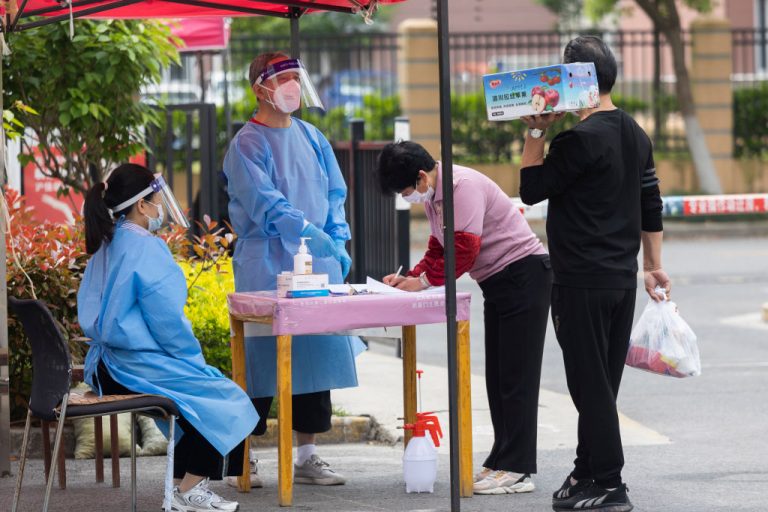Health authorities in Shanghai have again tightened restrictions on the movement of residents in some districts, and warned its 26 million inhabitants that the measures would continue until the virus was completely eradicated from all its neighborhoods.
After three weeks of stringent lockdowns that have fueled a deluge of tragedy and violence in China’s largest metropolis, some districts were told that restrictions would once again be tightened, even after they had supposedly met the criteria to be allowed to leave their homes.
MORE ON SHANGHAI’S CORONAVIRUS SITUATION:
- Shanghai Loosens Some COVID Restrictions, Allowing 4 Million People Out of Their Homes
- Locked Down Shanghai Residents: ‘We Are at our Breaking Point’
- Patients Die Waiting Outside Shanghai’s Hospitals as Zero-COVID Lockdown Continues
“Our goal is to achieve community ‘Zero-COVID’ as soon as possible,” Shanghai’s health officials said, referring to a target to stamp out transmission outside quarantined areas. “This is an important indication that we win this major, hard battle against the epidemic … so that we can restore normal production and life order.”
On April 21, leading epidemiologist Zhang Wenhong said that more than 430,000 people had been infected in Shanghai. However, he claimed the death toll remained at only 25, or a death rate of under 0.1 percent.
Following Zhang’s statement, many people questioned the government’s statistics as the Chinese regime has been known to conceal accurate figures. A few residents revealed on social media that their family members had passed away after being infected in mid-March, but their cases had not been listed in the government’s official death data.
Elderly deaths contradict Shanghai’s figures
Success
You are now signed up for our newsletter
Success
Check your email to complete sign up
Others reported that dozens of elderly patients inside nursing homes had died after contracting the virus, but official government figures have also not included those numbers.
On March 30, a netizen in Shanghai disclosed that the Donghai Elderly Care Hospital had recruited new housekeepers. After the housekeepers arrived on the evening of March 28 however, they found that a large number of patients had tested positive for the virus, and all of the medical staff on-site had been sent away to quarantine in makeshift camps and hospitals. The housekeepers said the facility was in such poor shape that you couldn’t even find toilet paper, and many had no choice but to sleep on hallway floors.
A nurse staffed at the facility said, “I was one of the victims. On the first day we entered the hospital, they directed us into the ICU and told us to stay with patients that had tested positive,” she said.
“The seniors there had it worse. There were elderly people passing away everyday.”
Another resident who had a family member in a nursing home said, “The pandemic prevention in Donghai Elderly Care Hospital is out of control. More than half of the doctors, nurses and nursing workers have been quarantined. My 96-year-old grandmother is paralyzed in bed but no one is taking care of her.”
Driven to eating feces
In a video shot by a housekeeper, an elderly woman was seen eating her own feces after going days without food. The housekeeper said that she was the lady’s caretaker and would go to her home every afternoon to bring her food as she lived alone and could not care for herself.
However, after the pandemic restrictions were enacted in Shanghai on March 28, the caretaker was unable to go for several days.
After two weeks, the caretaker said that when she finally had a chance to visit the lady, a foul odor emanated from the room, and she saw her chewing on something.
“What are you eating, ma’am?” the caretaker asked.
The elderly resident replied with half-chewed excrement in her mouth, “I’m hungry, I’m hungry.”
“At this time, I was unable to utter any words, I could only burst into tears,” the housekeeper said. “Poor old lady. She tried to survive by eating her own feces because there was nothing else left to eat.”
The elderly woman reportedly passed away several days later.
Thousands forced into quarantine camps
City authorities urged people to cooperate with the measures to ensure that progress made so far was not reversed. But many residents said orders were being issued en masse and indiscriminately for the sake of speed and efficiency, with little consideration for individual circumstance and wellbeing.
Shanghai resident Zhang Chen, 30, told Reuters that her four-year-old son and his 84-year-old grandmother were taken to a quarantine camp on April 20, along with her in-laws — and she was worried that poor conditions inside the facility might affect their health.
Videos and pictures of people inside these “quarantine camps” show dozens crammed into small rooms with insufficient beds. In some cases, people can be seen sleeping on cardboard boxes on the floor, or on reclining chairs.
Some quarantined residents also reported that some of the facilities had leaking roofs that would completely cut electricity and water, rendering them unable to shower or even use the bathrooms. Others reported a shortage of washing facilities, which were unable to meet the demands of the patients on-site.














